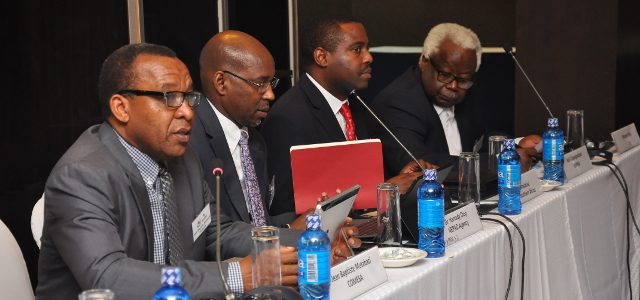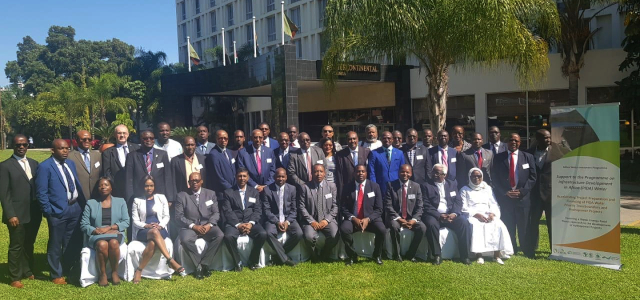The primary purpose of the workshop was to give all PIDA-PAP transboundary Water and Energy projects promoters and coordinating entities an opportunity to present the status of their respective projects, and agree on recommendations on how the PIDA Water Programme support can be targeted to accelerate implementation of the projects. The key stakeholders that contributed to the deliberations included Regional Economic Communities (RECs); River and Lake Basin Organisations (RLBOs), as well as funding and implementing partners. During the workshop, the project promoters also updated their individual projects information on the Virtual PIDA Information Centre (VPIC).
To strengthen the business case for investing in the projects, and thus contribute to accelerating projects financing, the PIDA Job Creation Toolkit was presented. Using the project information for the Batoka Hydropower scheme, a demonstration on how to use the kit was provided to the participants. In addition, a presentation was made on ensuring a Water, Energy and Food (WEF) Nexus approach to project preparation based on both the Nexus Screening Tool – championed by the Southern African Development Community (SADC); and the SADC WEF Nexus Framework.
Speaking on behalf of Mr Symerre Grey–Johnson, Head of AUDA-NEPAD's Regional Integration, Infrastructure and Trade Programme, Dr Hamady Diop underscored the need for fostering strong partnerships among stakeholders in tackling the challenges that affect the progress of implementation of water projects.
“By virtue of their transboundary nature, water projects require strong partnerships. For us to be able to deliver on the goals of PIDA Water, there is need to provide incentives for countries and regions of Africa to cooperate in addressing transboundary water-related issues. It is through partnerships that the African continent will be able to draw lessons from its own achievements and failures whilst at the same time taking the responsibility of replicating its success stories” said Dr. Diop. The sentiment was echoed by both Eng Jean Baptiste Mutabaazi, the Director for Infrastructure and Logistics at the Secretariat of the Common Market for Eastern and Southern Africa (COMESA); and Mr Thomas Banda who represented the Executive Secretary of the African Ministers’ Council on Water (AMCOW).

L-R: Eng J B Mutabaazi, COMESA; Dr H Diop, AUDA-NEPAD; Mr A Simalabwi, GWP Africa Coordination Unit; Dr. Kuiri F Tjipangandjara, GWPSA Board Chairperson
In his opening remarks Dr. Kuiri F Tjipangandjara, GWPSA Board Chairperson echoed the same sentiments on partnerships, adding that, as a partner in PIDA Water, GWP is committed to providing the necessary support in implementing the PIDA Water Programme in all its phases. “GWP will provide support to PIDA WATER within the framework of the Africa Water Investment Programme (AIP), which was endorsed by the African Ministers' Council on Water (AMCOW) this year. GWP will work with all the parties in mobilizing the relevant partners, expertise and resources that are necessary for the implementation of the various projects under the PIDA Water Programme”, said Dr. Tjipangandjara.
In 2012, the African Heads of States adopted the Programme for Infrastructure Development in Africa (PIDA). PIDA is a programme of the African Union (AU) implemented by the planning and coordination Agency of the New Partnership for Africa’s Development (NEPAD). The PIDA Priority Action Plan (PIDA PAP) comprises 51 cross-border programmes covering four sectors transport, energy, trans-boundary water resources management and ICT.
In November 2017, the NEPAD Agency and the African Ministers Council on Water (AMCOW) with support from the Government of Germany through GIZ – commissioned a review of the implementation of transboundary water projects under PIDA. According to the review water projects showed little progress compared to projects in other PIDA focus areas: ICT, Energy, and Transport. According to the evaluation, several factors contribute to the lack of progress. One of the key challenges is inadequate information on the priority water projects, including lack of information on the status and blockages associated with their implementation.
To address this gap, the NEPAD Agency in collaboration with Global Water Partnership (GWP) has established ‘NEPAD PIDA Water Programme’ commencing from 2019 until 2024.
The objective of PIDA Water Programme is to provide support in two areas:
a) Assist in early stage preparation of selected projects;
b) Facilitate the financing of these water projects.
The Lusaka workshop builds on previous events convened by AUDA-NEPAD and its partners. The PIDA Water Programme was unveiled by the African Union Commission (AUC), AUDA-NEPAD, the African Development Bank (AfDB), Africa Water Facility (AWF), AMCOW and GWP in August 2018, at a side event organized by AUDA-NEPAD and GWP during the Stockholm Water Week. In November 2018 AUDA-NEPAD and GWP signed a memorandum of understanding (MoU) to accelerate the implementation of priority continental water infrastructure projects within the framework of the Programme for Infrastructure Development in Africa (PIDA) and the Africa Investment Programme (AIP).
For more information on the workshop click on this link
